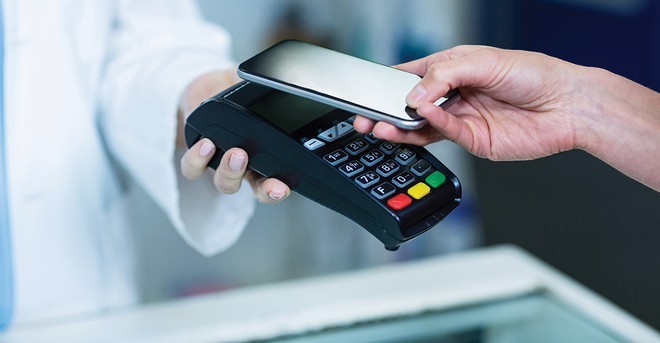A report found that since the outbreak, the total number of non-cash payment transactions via the State Bank’s finance switching system increased by 76 percent compared with the same period last year.

Of this, the number of transactions with small value (below VND500,000) increased from 21 percent of total transactions to 25 percent. Meanwhile, the total transaction value increased by 124 percent. This shows the growing trend of using online transactions and non-cash payment tools.
Analysts said non-cash payment value has increased because Vietnamese now use contactless payment to avoid the spread of the virus.
They said this is a ‘golden opportunity’ for Vietnam to popularize non-cash payments.
| Under the national financial inclusion strategy by 2025 approved by the Prime Minister in January, businesses will be allowed to join the finance switching and electronic clearing market. |
Under the national financial inclusion strategy by 2025 approved by the Prime Minister in January, businesses will be allowed to join the finance switching and electronic clearing market.
This is a solution to end monopolies, creating competition, reducing costs, and accelerating the cashless payment process.
According to lawyer Truong Thanh Duc from Basico Law Firm, in finance switching with electronic clearing, NAPAS (The National Payment Corporation of Vietnam) is the only unit that provides payment infrastructure to dozens of Vietnamese and foreign banks.
The tendency for non-cash payment is growing rapidly. Therefore, it will be difficult to speed up transaction processing and accelerate comprehensive financial universalization across the country. The appearance of more service providers in the market is necessary.
Non-cash payment account for 20 percent of total transactions in Vietnam. The current electronic payment system can satisfy a part of the demand in urban areas, while it is nearly absent in rural areas.
The thin coverage of service provision points and high costs are the barrierd that prevent low-income earners from accessing official financial services.
Experts believe that the State Bank of Vietnam should grant licenses to technology and telecommunication firms to join the market to promote new types of payment.
The Ministry of Information and Communications has proposed that the government and state management agencies quickly make decisions on issues on non-cash payment and mobile money which are still under consideration.
When cashless payments grow, all people and businesses will get benefits, including the people living in rural areas, remote areas; poor, low-income earners; and small and medium enterprises and business households.
Luong Bang

Cashless payments become popular amid COVID-19
Money can spread germs and bacteria, and amid the complicated developments of the novel corona virus Sars-CoV-2, many people have switched to cashless payments to protect them from unnecessary contact with contaminated money.

VN central bank delays foreign ownership cap in payment services industry
The State Bank of Vietnam has said it will not cap foreign ownership of companies in the payment services industry in its draft decree to replace Decree No.101.
 Minister of Information and Communications Nguyen Manh Hung says that Covid-19 has brought great challenges, but that challenges are often associated with opportunities.
Minister of Information and Communications Nguyen Manh Hung says that Covid-19 has brought great challenges, but that challenges are often associated with opportunities.